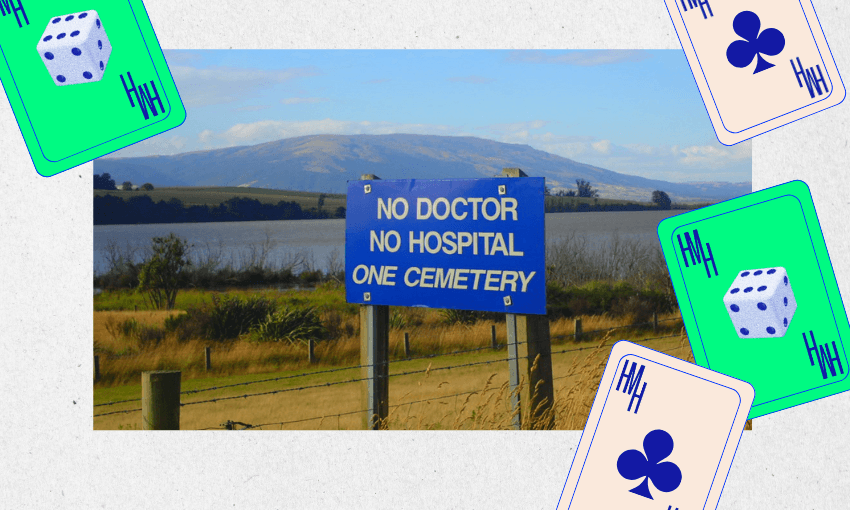Every time I visit him, he’s under a dark cloud. How do I stop feeling sorry for him?
Want Hera’s help? Email your problem to helpme@thespinoff.co.nz
Dear Hera,
I have a friend who is stuck in a job he hates, with the same rotating cast of insecurities, still living with parents who have spent their lives dragging him down.
He lives in the small town where we grew up. Five years after we left school I felt worried for him, 10 years after we left I felt sad for him. Now even more years later, I feel guilty. Like somehow by bearing witness I am culpable, or that I could change his situation if only I gave more unsolicited advice, or emailed him out-of-town job listings once in a while.
I can’t shake my memories of the funny, bright and creative kid I knew, but every time I visit, there he is, behind a counter, under a dark cloud.
How can I stop feeling so sad every time I think of him?
With appreciation,
Not my problem

Dear Not my problem,
It’s hard to see someone you care for struggling without leaping in and trying to help, like they’re a beloved cat with their head stuck in a bag. It’s even harder to see someone repeating the same doomed pattern year after year, especially when, from your perspective, the solution is painfully obvious.
I don’t think there’s anything wrong with throwing out the occasional crumb of encouragement. There’s nothing offensive about periodically sending job listings, if you’re careful not to be too heavy handed. Only you know your friend well enough to say if he’d interpret this as a personal criticism, but I think an infrequent “you should apply for this job and come ice fishing with me” is a relatively benign way of showing you miss his company, and would be excited to help if he decided to make a big change. You could even attempt to win him over by inviting him to visit you. Show him a glimpse of the life he’s missing. Maybe he’ll be so electrified by your urban roundabouts and modest selection of regionally specific restaurants, he’ll feel empowered to start looking through flat listings.
But you wisely didn’t ask for advice on how to fix his problems. You asked how to stop feeling so sad on his behalf.
Here’s what I think.
I think it’s OK to be a little bit sad for him. You obviously care about him, and would like to see him happier than he currently is. However, I don’t think there’s anything uniquely tragic about his situation. Most people can list at least three things they could do tomorrow in order to change their lives for the better. But changing your life is hard. Sometimes we’re not ready. Sometimes we’re too comfortable in our apathy. Sometimes we just don’t have the financial freedom to quit our jobs and move to Portugal to open an upmarket women’s hat shop, or whatever we believe will fix our lives.
I guess what I’m trying to say is that everyone is, in some ways, failing to live up to their potential, and ultimately it’s not the end of the world.
There’s nothing unique about your friend’s situation. People have been living in uncomfortably close proximity to their families, in the dead end towns they were born, beset by a vague sense of melancholy for almost all of human history. It’s the premise of almost every Thomas Hardy novel. Not that the lives of Thomas Hardy characters are necessarily worth aspiring to. But I think the expectation that everyone should have an inspirational, successful and emotionally fulfilling life is a fantasy of modern capitalism. That doesn’t mean it’s not worth following a dream, should you have one. But falling short of your own expectations and settling down somewhere less glamorous than you intended doesn’t make you a failure or a loser. Statistically speaking, it makes you normal.
It’s also important to remember that no matter how well you think you know someone, there’s no way of really knowing what goes on in other people’s lives. Maybe your friend truly is making the best decision for himself. Maybe he’s happier and more content than you know. Some people love complaining, but it doesn’t always mean they’re haunted by misery, just as those who project an image of success and happiness aren’t necessarily being truthful about the reality of their lives.
Even if you wish you could provide a more concrete form of help, that doesn’t mean you’re failing him. Sometimes the kindest and most meaningful thing we can do for others, is simply to keep them company, and bear witness to their lives.
Maybe a time will come when he is ready to make a change. If so, knowing he has someone in his corner might make all the difference. But even if he never ventures more than 10 feet beyond his front door, the kindest thing you can do is to keep finding ways to reach out and offering him an occasional respite from the drudgery. Your friendship probably means more to him than you know.

